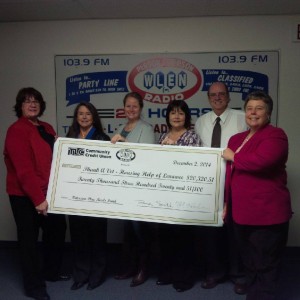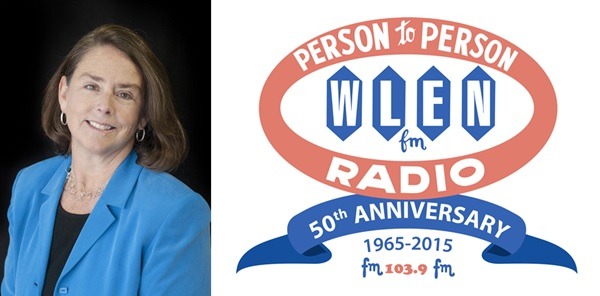Finding ways to truly serve local communities is one of the basic tenets of being a broadcaster. Many stations across the country do wonderful work helping raise funds for charitable organizations, helping individuals caught in difficult circumstances, and providing valuable information in times of crisis.
But very few stations take that mission to heart like WLEN in Adrian, Michigan. Privately owned by the Koehn family since its inception, WLEN focuses on being a source of assistance for the people, organizations and businesses in Lenawee County, and is not just surviving but thriving by staying true to its mission. So often, we read about the biggest stations across the country, owned by the largest companies. But institutions like WLEN continue to prove that the spirit of radio is alive and well in smaller markets, and that the torch is being carried by family-owned stations you’ve never heard of.
WLEN was honored in 2010 as the National Association of Broadcasters Small Market Station of the Year, won Crystal Awards for excellence in community service, and received its second Service to America Award – which honors stations for excellence in serving the children of their community – in 2009. Most recently, WLEN received an NAB Crystal Heritage Award in Las Vegas, honoring stations that have won five of these coveted awards.
In this week’s edition of Radio’s Most Innovative, we talk with WLEN President and General Manager Julie Koehn about the station’s extraordinary commitment to being an integral part of the local community in good times and bad.
JM: With competitive signals coming in from all around Adrian, describe how the geography of your market drove the decision to become so community focused?
JK: Local focus is our survival. We have 56 major and medium market signals in the county, along with local competition. You can get just about any format you want on the dial, not to mention what’s available online. So our niche has to be local news and information you can’t get anywhere else. That’s why people listen to us. If all they want is music, there are lots of other sources.
JM: As a standalone radio station serving a county of 100,000, you are not just surviving but thriving. What are you doing that is different than other broadcasters?
JK: I’m not sure what we’re doing is different than other small market broadcasters. We want to be here and we’re committed to it. We’re not necessarily in it for the balance sheet or the stock dividend; we’re more about making a difference in people’s lives.
We still have to pay the bills and our structure helps us thrive. It makes people want to be a part of what we have going on. Everyone likes to be on a winning team, be it staff, the community, our advertisers or our listeners; each of which is a customer of WLEN. So we just call it “excellent customer service.”
We also try to manage everything with formalized efforts and not to run by the seat of our pants. But this is live radio and sometimes we do run by the seat, and it’s fun! Still, we try to learn from every effort and put in systems to make things easier.
JM: WLEN is known for community service. Describe the strategy behind your approach and how it helps you with both the community and revenue.
JK: Several years ago we decided that to survive and thrive, we needed to be a community asset, the place people turned to for everything: news, information, severe weather info, and help. We followed the philosophy: “If we build it, they will come” and “If we take care of our community, they will take care of us.” The result has been a loyal audience that generously respond to our calls to help non-profits and support clients who advertise with us. Our advertisers see real results because our audience is so engaged.
As far as revenue, we are a conduit for community service by hooking our business customers with local non-profits, both individually and through WLEN’s events and programs. Also, we don’t look at ads as an interruption in our programming. We view every business actively, creating commerce as a “community asset.” Well-written, creative ads are simply entertaining facts about those assets. We are very serious about advertising, as well as education and entertainment, and work hard to create great ads. But we are also very protective of our listeners and make sure our ads are as factual as possible.
JM: During the recent “depression” Michigan endured, how did you adjust and still manage to maintain that level of community service?”
JK: As a bedroom community to Detroit, the economic change hit us hard. We lost almost all of our auto-related manufacturing jobs. We were also home to Merillat cabinets. So when the housing crisis followed the auto meltdown, it was a one-two punch as Merillat moved their manufacturing out of state. People were scared. They were losing jobs and businesses were closing. Our community lost about 10% of our population and you could buy a house for less than $20,000.00.
As this was happening, we knew our community would need us more than ever. My goal was to do whatever it took to maintain and actually grow our level of service to the non-profit community. So we made sacrifices as a team, thought creatively about ways to reduce expenses, and engage our customers in more meaningful ways. By treating customers more as partners and with really loyal advertisers, staff and listeners, we made it. Our work grew and fortunately that kept us afloat during the hardest of times when the economy changed all of our lives in 2009-2010.
My other personal goal, which we accomplished, was not laying off any full-time staff. We had people relying on their positions as the sole source of family income and health benefits. We also embraced every piece of good news we could. Every new or retained job was critical and all of these things were celebrated. We promoted good news features and still do.
JM: How does the “Hometown Hope” project work?
 JK: Each October we accept applications for a monthly marketing grant given to non–profit organizations in our community. In November, station personnel and local business leaders judge the applications, and twelve grants for the following year are awarded. Each includes a $3,700 marketing campaign on our station with professional copyrighting and production, a spot bank of commercial announcements, a live broadcast and morning show chat.
JK: Each October we accept applications for a monthly marketing grant given to non–profit organizations in our community. In November, station personnel and local business leaders judge the applications, and twelve grants for the following year are awarded. Each includes a $3,700 marketing campaign on our station with professional copyrighting and production, a spot bank of commercial announcements, a live broadcast and morning show chat.
JM: How did the program get started and what challenges did you face launching it?
JK: The idea came to us from a couple of good friends, Mike Hulvey from Nuehoff Communications who got it from Roger Uthenmer of Nicolet Broadcasting in Door County, Wisconsin.
We decided to start the program because we were getting so many requests for help from local non-profits. It became more than we could handle staff wise, and we wanted to be protective of our listening audience when it comes to asking for their help. So we started Hometown Hope to make the process more systematic.
The challenge we faced launching the program was that many organizations didn’t get it. They didn’t understand the concept or didn’t believe the “free” part. The first year we had to recruit organizations to apply. Then as calls came in for “assistance,” we directed them to the program to apply for the following year. We now have over 40 non-profit grant applications each year; quite a few for a city license of 20,000 and a county of 100,000.
JM: The station also has a “Community Action Squad.” How did it come together?
JK: Just like programming or sales, we view community service as another arm of our plan. Our 17 full and part-time employees donate over 1,000 hours both on and off the clock in service to our community. So, like with “Hometown Hope,” our goal was to formalize our efforts into a comprehensive plan. That led to the “Community Action Squad” that includes squad apparel we wear when we are out in the community assisting or volunteering. It helps the public to see our squad and has helped create a real team atmosphere inside the station.
JM: What advice would you give to any size station about the importance of community service?
JK: Community service is good for the health and well-being of your organization and your community. A strong community makes everyone better and more successful. Formalize your efforts, record and keep track of them, and tell people about what you do. No one is going to tell our story like we can, and as an industry, I don’t think we do the job of telling our story well enough or often enough.
JM: What kind of research do you conduct to better understand what listeners expect from WLEN?
JK: We survey our listeners regularly and they tell us even when we don’t ask. At least once a year we run a major promotional giveaway with listeners on-site where we conduct surveys about our programming. This helps drive some of our decisions. We also hear regularly from listeners and advertisers (many are listeners as well) and we take all of it into account.
JM: WLEN’s programming includes live, local and state-focused news, a show for Spanish-speaking listeners called Radio Picoso and a lot of high school sports. What makes these such an important part of WLEN?
JK: We don’t have a lot of media sources delivering local, county news. We have a daily newspaper and some people get their news from Facebook (which isn’t always reliable). We carry high school sports because it is local. It’s another way for us to be a community asset and deliver local content that people want.
Our Spanish program delivers music, news, and local information to Spanish-speaking households which are estimated to make up nearly 10% of the market. The show also brings in listeners from around the region, not just Lenawee County. The program is locally produced and has a very active and engaged listening audience.
We’re staffed when breaking news or emergencies happen and P1s really do want to engage with announcers. The hosts develop followings and people seek them out at community and other events. And staffers all wear many hats. Just like the GM’s job, we’re all in this together and everyone pitches in.
So yes, we have a large payroll. There is no doubt our bottom line would be much larger if we reduced wages and benefits, but we really see value in live announcers and will continue that as long as we can.
JM: What advice can you offer to other broadcasters – regardless of market size – based on what you’ve learned from the success of WLEN?
JK: Service to the community is good for everyone. You don’t have to have the size of staff we have to do amazing things. Leverage your assets to be the conduit for connecting non-profits and local businesses. That alone will strengthen your community and make you a bright, shining star people look to. And don’t be afraid to tell people about what you do! Nelson Mandela said, “As we let our own light shine, we unconsciously give other people permission to do the same.”
 JM: What has been the most gratifying WLEN public service program or event for you personally?
JM: What has been the most gratifying WLEN public service program or event for you personally?
JK: There is not one service or event that has been most gratifying. I do get choked up when I think about some individual things like our “Thank a Vet” fundraiser that led to the purchase of a pair of boots which enabled a veteran to get a job or finding beds for a family whose house burned down in just a few hours. I think the personal stories are the most gratifying.
What is very meaningful to me is our “Report to the Community,” an annual compilation of our service throughout the year. We send it to all our elected officials and clients old and new. It helps people who don’t know us find out who we are and what we do. It also helps us gauge what and how we’re doing; whether we are focusing on critical issues or need to adjust and move in another direction.
Most of all it is a moment our entire staff can be proud of. It shows all the service, how many people’s lives we affected, and how we made our community a stronger, more caring and vibrant place. It warms my heart. Radio is the most personal, vibrant, caring medium in the world. I’m proud to be a radio broadcaster and I hope our little imprint on the world makes a difference.
Thanks to Mike Stern for writing this week’s “RMI.”
INNOVATION QUOTE OF THE WEEK
“There are basically two kinds of people. People who accomplish things, and people who claim to have accomplished things. The first group is less crowded.”
Mark Twain
More of Radio’s Most Innovative
- Radio’s Most Innovative: Film House
- Radio's Most Innovative: Andy Economos' Selector
- Radio’s Most Innovative: Austin City Limits Radio
- Radio’s Most SKINnovative: Jim McBride
- Radio’s Most Innovative: PRX’s Podcast Garage
- Media And Technology In 2025: Believe It Or Not! - April 18, 2025
- In Radio, You Just Never Know - April 17, 2025
- The Secret To Making A Great Podcast (And Great Radio) - April 16, 2025






In 1970, I was invited as a college-bound senior to a High Scool Seniors Day luncheon at a local fraternal organization. My sponsor was WLEN owner, Mr. K. After lunch, Mr. K took me by the studios to give me a tour. I went on to college and the first thing I did was become a DJ on the college station. I went on to bcome GM of The University Of Michigan’s WCBN–FM. Then I went on to work in music, for A&M Records. Thank you Mr. K for making an impression on a young man and giving inspiration to pursue a career that I loved.
Great story, Ross. Thanks for sharing it.
WLEN gave me my first job in radio and, as an aspiring broadcaster, you couldn’t ask for a better opportunity. At WLEN, you could be an air personality, a music director, a journalist, and a copywriter, sometimes all in the same hour. The most valuable lesson I learned at WLEN, however, was how radio broadcasters can have a real impact in the lives of the listeners we serve by connecting, informing, and empowering them. For Julie Koehn, longtime PD Dale Gaertner and SM Patt Hayes, serving others isn’t something you do so you can be in radio; radio is something you do so you can serve others. Guess what? It’s also highly successful. You’d be hard-pressed to find anyone in Lenawee County who not only knows WLEN and listens to WLEN, but also feels a real and personal connection to WLEN, even if they also listen to WRIF or Kiss FM. Whether your station defines its community as the town you serve, a minority community within your metropolis, or simply the community of music fans who share your passion for your music, WLEN’s example of serving your community is a winning example for any station to follow.
A much wiser man than me talked about doing well by doing good. Clearly, that’s what has driven WLEN’s success. Thanks for sharing that story.
Thank God for people who have the heart to walk the talk and make radio what it’s supposed to be: profitable, community service – day in, day out.
Thanks,Andy. WLEN has truly made community service a key component in their success formula.